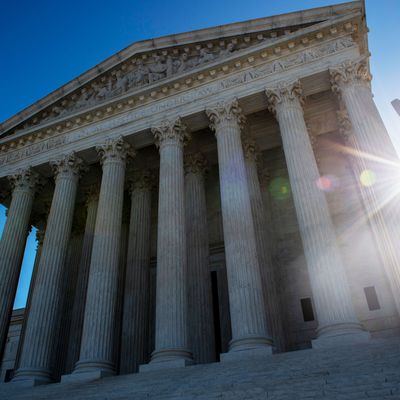
Aimee Stephens’s boss at Harris Funeral Homes called himself “old fashioned.” He required women employees to wear skirts and men to wear dark suits, because he believed that “a male should look like a … man and a woman should look like a woman.” Doing otherwise would violate “God’s commands.” When he fired Stephens after she’d worked there for almost six years, she argues, it was because she “departed from its owner’s sex stereotypes about how men and women should appear, behave, and identify.”
And yet this week, in a moment of terrifying historical weight, attorneys for the funeral home are asking the Supreme Court to say that Aimee Stephens wasn’t discriminated against on the basis of her sex — which is illegal under Title VII of the 1964 Civil Rights Act — because she is transgender. Weeks after Stephens sent a letter to her employer saying she had “decided to become the person that my mind already is” and would soon start wearing the uniform marked female, the funeral-home owner fired her. “Because he was no longer going to represent himself as a man,” her boss would explain, refusing to refer to Stephens by female pronouns. “He wanted to dress like a woman.”
In a brief written by the Christian-right legal-advocacy group Alliance Defending Freedom, Harris Funeral Homes claims that Stephens isn’t covered by civil-rights law because they “would have responded to a female employee who insisted on dressing as a man while working with grieving families the same way it responded to Stephens.”
Tuesday’s oral argument is likely to be the first time the word transgender has been spoken before the mahogany bench, Chase Strangio, one of Stephens’s attorneys at the ACLU, recently wrote, “and when the justices look out from the bench and see my co-counsel and me at counsel table, it may be the first time they have looked at transgender attorneys defending our own existence.” The justices are being asked not only to consider the case of Stephens and the separate cases of two gay men who say they were fired for their sexual orientation, but more broadly to answer the question of whether a person can be fired for being the wrong kind of woman or man.
That’s already supposed to be illegal. “In order to excise LGBT people from the protection of civil-rights law, the Trump administration is asking them to roll back sex-discrimination law for everyone,” Strangio told me in an interview. If the court accepts their arguments, Strangio said, “the enforcement of sex stereotypes in the workplace is lawful as long as it is complementary.” The government, in this view, can police the boundaries of gender as long as it does so for everyone; woe betide the cisgender woman at Harris Funeral Homes whose conduct is unbecoming to a lady.
It’s fair to say that legislators in 1964 probably weren’t contemplating cases like these. (According to Gillian Thomas’s Because of Sex, an account of the gender provision of the Civil Rights Act, they were mainly thinking about white supremacy, openly worrying that banning only racial discrimination would give black women more rights than white ones.) But for decades, the highest court has repeatedly allowed that federal ban on gender discrimination to be interpreted more expansively than the most literal meaning at that particular moment. The justices grasped over the years that sexual harassment is a form of discrimination against women, and in 1989, the court agreed that Title VII also protected a cisgender woman who had been fired from Price Waterhouse because she didn’t dress and act as women were expected to. The point of the law, a plurality wrote, was “to strike at the entire spectrum of disparate treatment of men and women resulting from sex stereotypes.” In 1998, no less of a conservative darling than Antonin Scalia wrote for the majority that men who were sexually harassed by men also were covered by the law, because while it was “assuredly not the principal evil Congress was concerned with,” the law could cover “reasonably comparable evils, and it is ultimately the provisions of our laws rather than the principal concerns of our legislators by which we are governed.”
As “reasonably comparable evils” go, a transgender woman and two gay men’s being fired for their gender identity and sexual orientation is hardly a stretch. The broader principle that the government cannot tell Americans how to be a man and how to be a woman underpinned the 1970s constitutional advocacy of Ruth Bader Ginsburg, who will sit on the other side of the bench Tuesday; that work already helped bolster arguments for marriage equality.
But Stephens’s opponents purport to be the true feminists. The attorneys for the U.S. Department of Justice, who filed a brief supporting the funeral home, claim that making it illegal to fire Aimee Stephens would “reduce bodily-privacy protections for everyone, and erode equal opportunities for women and girls.” They raise the fearmongering specter of “overnight facilities, showers, restrooms, and locker rooms.” Pseudo-feminist Astroturf groups like the Independent Women’s Forum have claimed that ruling for Stephens would ultimately “reduce the number of athletic opportunities for biological women and girls.” (Several legitimate feminist groups, like the National Women’s Law Center and a coalition of anti-violence groups, have filed on behalf of Stephens and the other plaintiffs.) Something called the Women’s Liberation Front, which boasts of “over 500 members,” accuses Stephens of having “bootstrapped” existing law to “revolutionize the legal meaning of ‘male’ and ‘female.’”
So-called bootstrapping has, in fact, been the history of how the creaky structures of the law have gradually made room for people historically left out of it. Women would still be lesser creatures under the constitution if Ginsburg hadn’t bootstrapped onto the 14th Amendment, which was written to protect the formerly enslaved. Movements are built on each other, in part out of a recognition of a common purpose (or, at least, a common adversary); the law has often followed, if imperfectly. Had the law not had room to grow, women still could be lawfully fired for being perceived as too aggressive, and all of the oppressions uncovered by Me Too might still be perfectly legal. The women who now believe they can shut the door after themselves may soon find themselves on the wrong side of it.






























